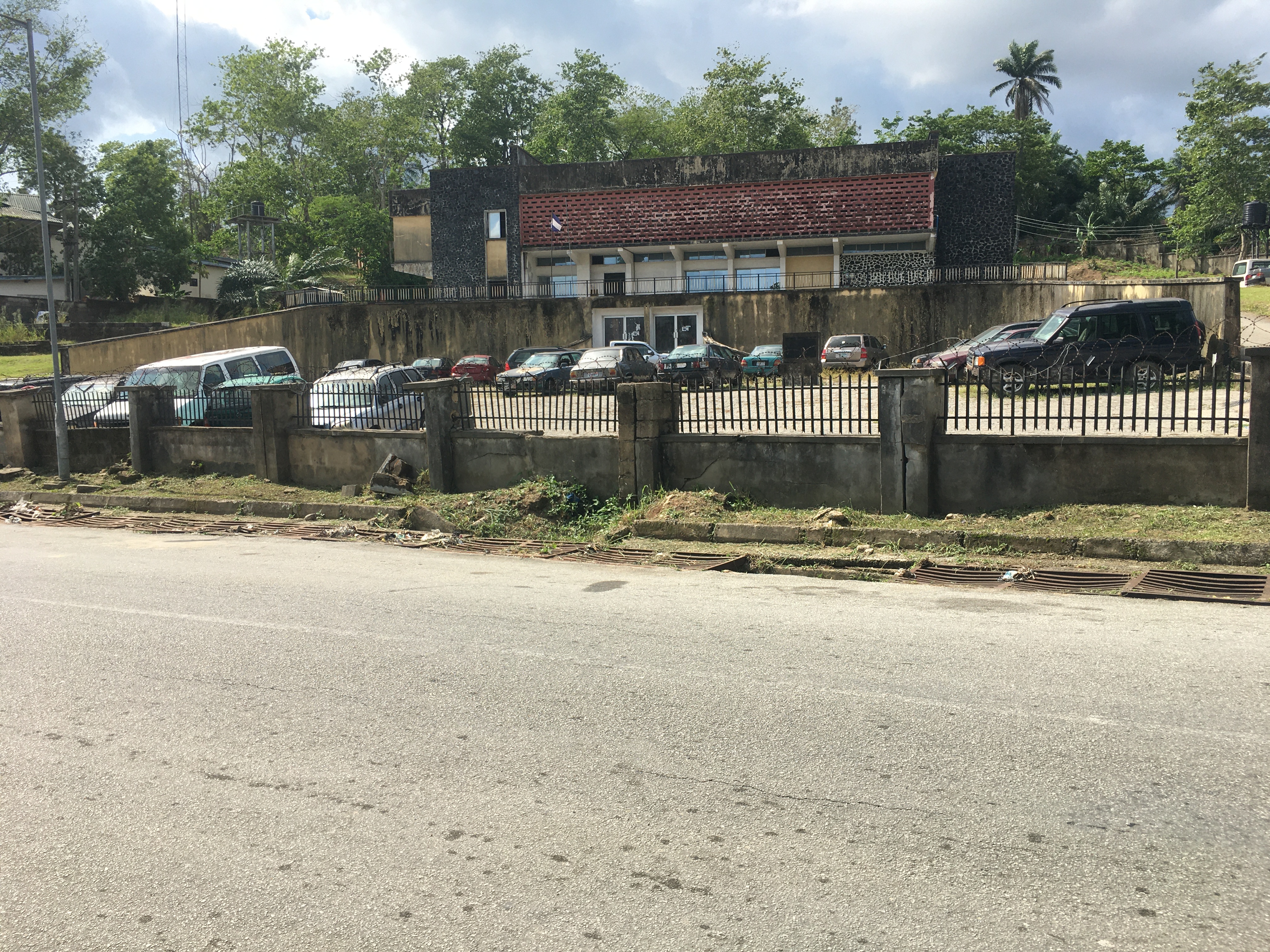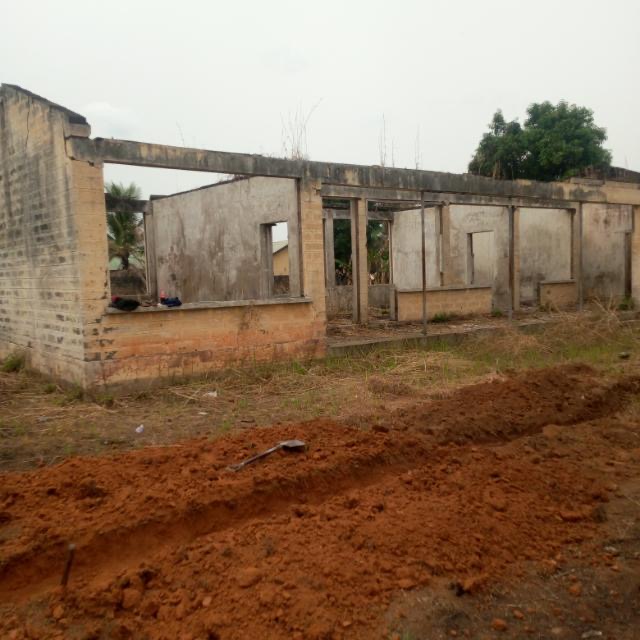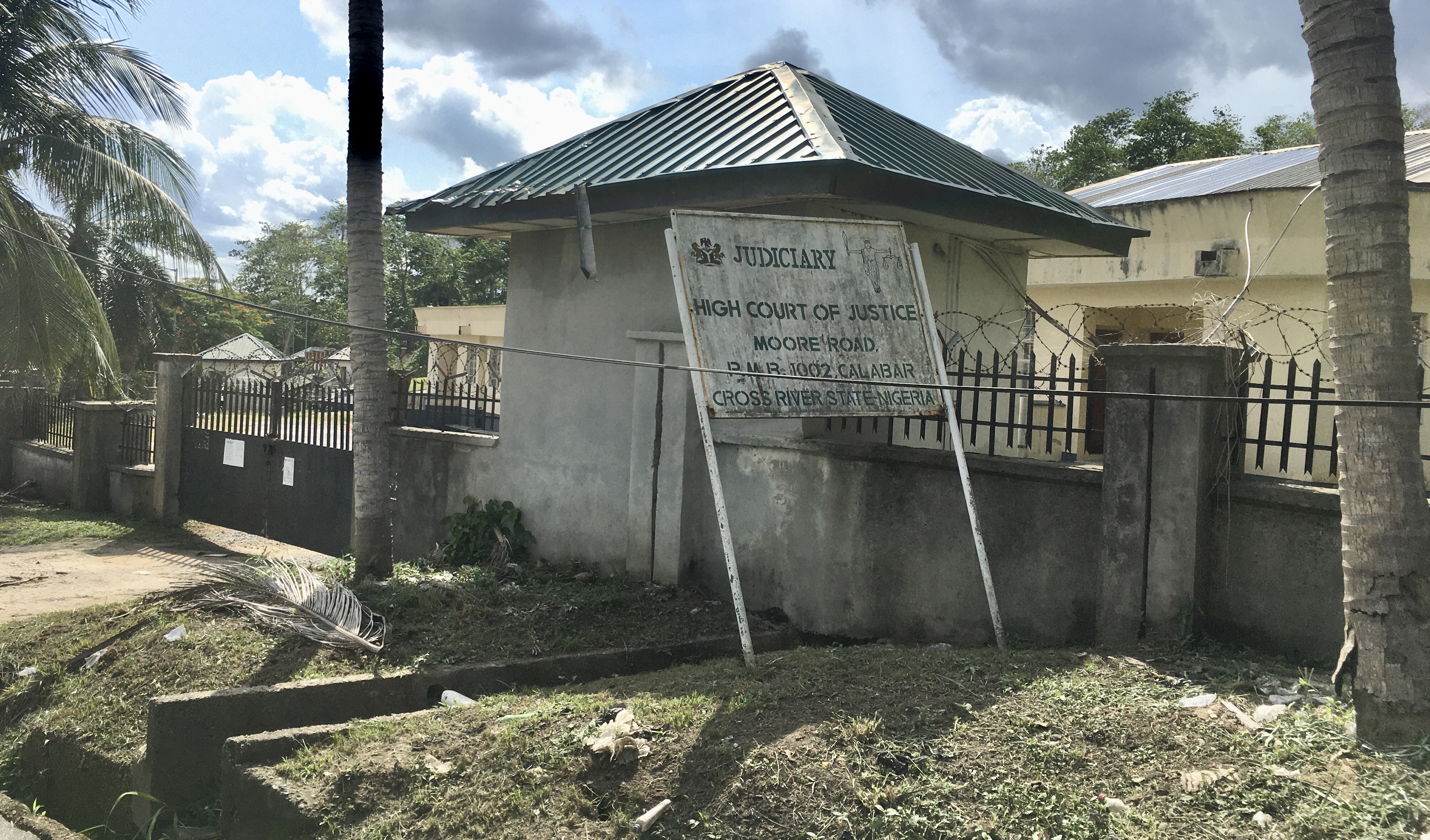By Jonathan Ugbal
The judiciary is the third arm of government in Nigeria and is often tagged “the last hope of the common man”. In Cross River, this last hope is threatened by decaying infrastructure across its 18 Local Government Areas.
Cramped, hot, stuffy, unprotected and empty are some of the words that are used to describe the over 100 functional, semi-functional and abandoned courtrooms that litter the length and breadth of the State – a situation which may have encouraged corrupt practices.
This is due to years of neglect, poor budgetary performance and deliberate arm twisting of the judiciary via non-funding by the executive arm. This has left what used to be courtrooms to be replicas of ruins found in sites for large budget films about the devastating impact of war or an end-of-the-world film.
“The Judiciary is an arm of government which by the provisions of the constitution, is supposed to be financially independent drawing its funding from the consolidated revenue fund, and, if you move from Bakassi to Obanliku, there is no befitting Courtroom or Judiciary premises that is habitable,” says James Ibor Esq, a rights lawyer and principal partner of Basic Rights Counsel. He added that: “In fact, in Bakassi, they don’t have a court, in Akpabuyo, they have abandoned the court because it collapsed on the Judges. In Calabar, the judiciary headquarters is leaking.”
What is good for the goose is good for the gander?
The situation is the same across the 10 divisions of the High Court of Cross River State and the almost 30 magisterial districts.
The State High Court has ten divisions namely: Calabar, Akpabuyo, Akamkpa, Ugep, Obubra, Ikom, Etung, Ogoja, Odukpani and Obudu with 19 High Court Judges of whom over 50 percent reside in Calabar which is near their jurisdictions. In Bekwarra, which has better infrastructure, the High Court is presided over by the resident Judge in Obudu Division.
All the 18 Local Government Areas have at least one magisterial district with Yakurr, Odukpani, Akamkpa and Biase Local Government Areas having at least three districts. A little lower than 100 Magistrates man the different Chief Magistrate’s, Magistrates, Family and Customary Courts.
Over 80 percent are in poor shape and as reported earlier, leaves an opening for corrupt acts. For instance, at the Judiciary headquarters located at the Mary Slessor Avenue in Calabar, findings by Newspaper revealed that the Chief Judge, Justice Akon Ikpeme regulates the use of the diesel fired electricity generator to mostly her benefit and when she retires for the day, other Judges power smaller generators.
And, Decay Begets Rot, Corruption…
The neglect over the years led to a rot in the infrastructure and forced judicial officers and the temples of justice to be exposed to the vagaries associated with poor funding, top of it all? Corruption.
“How do you allow judicial officers to purchase generators, renovate their offices, and furnish their offices to do official work? Where did they get the money? Yes, many of them will tell you ‘I used my money to furnish this place, I use my money to fuel the generator’ and all that. The truth is that the temptation to extort litigants becomes very high when you begin to use your money to provide infrastructure to do government work,” Ibor said.
He added that: “We have seen where Senior Advocates and other Senior Lawyers who handle criminal cases say okay, I donate a generator to this court, that should not be. Why can’t the Judiciary draw funding from the consolidated revenue fund as it is stipulated in the constitution.”

Findings revealed that the sharp practices happen from the clerks to the bailiffs and even the registry.
For instance, to depose to an affidavit of a missing, stolen or lost sim card, the judicial officers will write any amount between NGN300 to NGN1,000 but will collect a minimum of NGN2,000.
Deposing to an affidavit of facts in a suit is also another aspect as there is no known sum published anywhere as to the actual cost.
For bailiffs who are asked to execute judgment or verify properties for those standing as sureties among others, it is usually a lucrative business as they negotiate any amount between NGN10,000 and NGN100,000 with the surety to write a favourable report accepting that they had verified the properties – a situation that could lead to their arrest, prosecution and serving a jail term.
Executive tactics for Judiciary target…
Asides the flagrant disregard for Section 121 subsection 2 of the 1999 constitution of the Federal Republic of Nigeria (as altered) by the Executive arm of government, there are a few more tricks the State has used in the past and present. One is handing out cars to Judges and judicial workers.
These, legal practitioners and unions say is akin to judicial corruption.
“It is judicial corruption for governors to give cars to Judicial officers, it is Judicial corruption for the Governor to openly brag that he did not approve the appointment of Magistrates or Judges – there is a procedure, if the Governor is making reference to that procedure as provided for in law, it is understandable, who recruits Magistrates? There is a commission (Judicial Service Commission) that recruits Magistrates (and) Judges and they work together with the executive and the legislative arm,” Ibor said.
The Chairman of the Cross River State branch of the Judiciary Staff Union of Nigeria, Comrade Asanya Ebong also condemned the act of purchasing cars for Judges and judicial workers after appointment. He described it as bribery.
“We can buy vehicles for our Judges, we want to do our things independently. You know the judiciary is the hope of the common man and we cannot deny them such privilege or right,” Ebong said in an earlier interview 10 days into the current industrial action of the union.
He continued: “Nobody should expect the Judiciary to go cap-in-hand to beg the executive for money, we need to be independent and a situation where a Governor gives out car keys after appointment of Judges is not right, it is a means to seek favour. The Judiciary is supposed to buy cars for her Judges and do her things independently.”
The spat between the former Chief Judge of the State, Justice Michael Edem and Governor Ben Ayade was well reported which led to the eviction of the Chief Judge from his official residence with the sister of the Governor residing there for a while.
All the acting Chief Judges were denied access to the residence and it was only returned to Justice Ikpeme shortly after her delayed swearing-in as the substantive Chief Judge.
Also, only Justice Emmanuel Ayade, a cousin of the Governor has been given an official vehicle – a Ford Edge SUV after he was sworn in as a Judge of the High Court among the eight others sworn in by Governor Ayade since his assumption into office.
A third case has been the continuous refusal to pay the legal entitlements of 45 Magistrates engaged and sworn in by the Chief Judge on February 3, 2019. 16 who were converted from the ministry of justice are been paid their old salaries while the remaining 29 of them who came from private practice have continued to protest their non-payment and were directed by the then acting Chief Judge, Justice Oyo Effiom in January 2021 to stop hearing cases until their pay was settled as it had opened them up to corrupt acts.
“There is no conscientious reason to have allowed you work without pay for all this while as you may be tempted to fall into corrupt practices in order to survive. There are in fact, a handful of reports already received against some of such Magistrates,” read the letter dated January 4, 2021 and signed by the Chief Registrar of the High Court, Edem Okokon.
These, among others, have led to Judges and Magistrates, often relying on very strange grounds in their rulings, orders and judgments. And, sometimes, are usually forced or arm twisted to make a U-turn. For instance, when Justice Ukpai Ibitham garnisheed the account of the State in favour or a contractor, Lilleker Bros, he was visited by the Attorney General and it was resolved in Court that both parties will settle the matter.
And, Ibor said he fears the executive may never allow judicial autonomy because it wants to, “perpetually be in control to manipulate the judiciary to do their bidding. Have you not wondered what litigants must go through to enforce judgment against the government? It is almost impossible to enforce judgment against the government. It is only in Nigeria that you must seek permission from a judgment debtor to garnishee account and of course the judgment debtor will not allow you to do that. In Nigeria, they tell you the Attorney General will have to approve.”
When pressed on whether this was part of the laws of the land, Ibor said that there was a decree to that effect which, “the Supreme Court somehow has been very reluctant to set aside. They have been playing games with it and that is because the executive arm wants them to play games with it.” He lamented that the unpredictable justice system was causing capital flight because the heads of the judiciary still go cap in hand to Governors to beg for funds which will be granted based on conditions.
Sources informed these reporters that NGN25 million is what is usually approved by the Ben Ayade’s administration as monthly funding for the Judiciary. However, CrossRiverWatch could not independently verify these as efforts to reach the Registrar of the High Court proved abortive and his office remained under lock due to the strike of the Judiciary Staff Union.
Decay Impacts Performance…
If Author, Woody Harrelson’s quote that; “In the courtroom, it’s where a lawyer really becomes an actor. There’s a very fine line between delivering a monologue in a play and delivering a monologue to a jury,” were to be a standard, then most courtrooms in Cross River State would have been theatres avoided by most actors – lawyers.
And, for Chris Utubaku Esq, the words of the author are not far-fetched as he, a legal practitioner plying his trade mostly in the State has had to use his judicial lingo in courtrooms that are unfit for humans to operate in, a situation he said, impacts on the criminal justice system and the entire judiciary as services were bound to be poor.
“Your environment actually encourages your performance. If you are working under uncomfortable environmental conditions, you will not be able to perform like when you have a favourable environment but we try as much as we can to balance the environmental lapses with our professional prowess,” he said adding that legal practitioners, litigants and those being prosecuted are not spared.
“Even the accused persons who are brought in often end up standing outside in (hand)cuffs. Because you are standing trial, you should not be subjected to that kind of treatment when you have not been convicted.
“Sometimes, when the Courtroom is crowded, you will find yourself standing outside and that already impacts on you physically when you ought to relax, be comfortable thinking about how you are going to prosecute your matter but you are standing outside. If your matter is called and there is no space for you to sit, someone has to stand up for you, but that person has to be gracious enough to give you a space if not you will sit far back at the gallery if there is any,” Utubaku said.

Ibor, who is the secretary of the Justice Sector Reform Team also disclosed that his Team alongside British Council, ROLAC among other institutions have held several trainings which have yielded minimal results especially on pre-trials and the new sentencing guidelines.
Among the factors that led to the minimal results, was the low number of courtrooms, decaying infrastructure and fewer judges who have thousands of cases to decide. “You see a judge have 10 or more cases on the cause list and before you know it, they adjourn the rest. Also, we don’t even engage in pre-trial properly so that cases will be heard on day-to-day basis as it ought to be,” Ibor said.
Court Sharing, Delayed Justice…
Furthermore, the lack of courtrooms and space to operate which led to Judges and Magistrates sharing courtrooms, has led to a glut in the system with over 20,000 cases pending determination.
Utubaku, who said the Magistrate courts are the worst hit, complained that the “Courtrooms are small. So, you find that in this era of health challenges, COVID-19 and what have you, you find lawyers and litigants cramped up in a small space. Citing more examples, Mr. Utubaku in what seemed like poetic injustice, said the Magistrate Court at Garden Street in Calabar was “empty with no seats and the few left already rotten.”
He argued that: “When you get to a place that is in a poor and dilapidated condition, you should expect that the services you get will be poor too,” and insisted that the sorry state of the Courtrooms impacted on the output of the lawyers and their colleagues in the bench.
Judges, Magistrates characteristically keep mum…
CrossRiverWatch reached out indirectly to one Judge and directly to three Magistrates who confirmed that there have been cases where their colleagues resorted to sharp practices to make ends meet. The Judge and Magistrates said they cannot speak to journalists on the matter.
However, CrossRiverWatch will reproduce some parts of the conversations here.
“We are supposed to have official residences, official cars and security, but none of these has been provided and our seniors who benefitted from these in the past have their vehicles in very bad shape,” one of the four mentioned above said.
The second added: “These days, all we ask for is the vehicle to be able to commute ourselves to hear matters and not be subjected to the vagaries of public transportation which sometimes includes litigants, that is akin to descending into the arena.”
Another said: “Some of my colleagues have had to rent apartments from their pockets as the official residences are bad and the problem is, if you renovate it with your money, you don’t know how long you are going to stay in that posting. If you rent a house outside and you pay for a year or as some landlords will want you to pay for two years, and you are posted to another district or jurisdiction in a few months, what will you do?”
Natural Repossession and Citizen’s Recovery…
Due to the abandonment of some of these court premises ravaged by windstorms, heavy downpour and wars, it has led to locals utilising either part of or whole court premises for purposes other than they were meant for.
For instance, the High Court premises in Akpabuyo division has been reclaimed by rodents and grasses since the Court moved to Calabar for security reasons, with only the Magistrates assigned to that magisterial division sitting to hear cases in the Local Government.
At the Customary Court in Okworotung, located over 300 kilometers north of Calabar, a family utilises most of the offices as their residence while the main courtroom is used to dry rice that has been parboiled before milling, cassava shavings, groundnuts, melon and other items.
The Ogoja Magistrate Court 2 was abandoned and the land was sold by the current administration to the Leader of the ninth Cross River State House of Assembly, Peter Odey (PDP, Ogoja). However, following an outcry from the masses and several reports by this Newspaper, the lawmaker hands off the site and donated NGN250,000 for the renovation of the court.

Common Men Saving Their Last Hope…
However, all hope may not be lost as some residents have been making efforts to fix some courtrooms in the State. It began with a former acting Chief Judge, Justice Oyo Effiom-Ita who, alongside senior members of the Nigerian Bar Association in the branches across the State raised money to fix some courtrooms.
In Ogoja, over NGN2.5 million was raised via crowdfunding and private donations in what is now called “The Campaign to Recover and Renovate the Ogoja Magistrate Court 2.” Despite funds being raised in March 2021, work was delayed until late April due to bureaucratic bottlenecks. The support beams have since been reinforced, the court roofed while electrical and other works are ongoing.
Since You Are Here, Support Good JournalismCrossRiverWatch was founded on the ideals of deploying tech tools to report in an ethical manner, news, views and analysis with a narrative that ensures transparency in governance, a good society and an accountable democracy. Everyone appreciates good journalism but it costs a lot of money. Nonetheless, it cannot be sacrificed on the altar of news commercialization. Consider making a modest contribution to support CrossRiverWatch's journalism of credibility and integrity in order to ensure that all have continuous free access to our noble endeavor. CLICK HERE |
New Feature: Don't miss any of our news again.Get all our articles in your facebook chat box.Click the Facebook Messenger Icon below to subscribe now
Text Advert by CRWatch :Place Yours

Will You To Learn How To Make Millions Of Naira Making Special Creams From Your Kitchen?.Click Here
Expose Your Business And Make More Sales. Advertise On CrossRiverWatch.com Today



Leave feedback about this